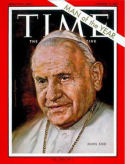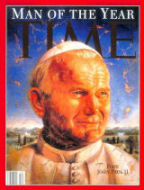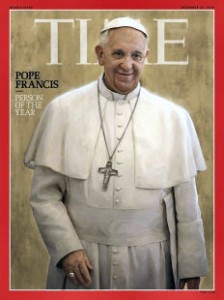Are words and symbols enough? Continue reading
 Two popes had previously been named Time magazine’s Man of the Year. John XXIII was chosen for 1962, the year that he opened the Second Vatican Council and charged it with bringing the Church into the twentieth century, or at least the Age of Enlightenment. It was a dramatic decision. The Church had not convened an ecumenical council in a century, and that last one was called to rubber stamp decisions made by Pope Pius IX. In contrast, John XXIII had set in place a mechanism for listening to new ideas and implementing the best of them.
Two popes had previously been named Time magazine’s Man of the Year. John XXIII was chosen for 1962, the year that he opened the Second Vatican Council and charged it with bringing the Church into the twentieth century, or at least the Age of Enlightenment. It was a dramatic decision. The Church had not convened an ecumenical council in a century, and that last one was called to rubber stamp decisions made by Pope Pius IX. In contrast, John XXIII had set in place a mechanism for listening to new ideas and implementing the best of them.
 John Paul II was chosen for 1994. By that time the pontiff’s role in undermining the Communist governments in eastern Europe was becoming clear. He provided spiritual support for all of those movements, and he did much more than that for Poland. Many people still do not realize that the Vatican bank underwrote the political campaigns of the Solidarity Trade Union that eventually brought independence and democracy, not to mention the resurgence of Catholicism, to the Polish people.
John Paul II was chosen for 1994. By that time the pontiff’s role in undermining the Communist governments in eastern Europe was becoming clear. He provided spiritual support for all of those movements, and he did much more than that for Poland. Many people still do not realize that the Vatican bank underwrote the political campaigns of the Solidarity Trade Union that eventually brought independence and democracy, not to mention the resurgence of Catholicism, to the Polish people.
Plenty of Catholics would argue that either or both of these two dynamic leaders were misguided (or maybe even tools of Satan), but no one could claim that they were ineffective or that their acts were of little consequence. Both pontiffs were masters at public relations, but they also knew how to convert their popularity into meaningful changes. They were actors.
Bestowing this title on Pope Francis seems to me comparable to giving the Nobel Peace Prize to Barack Obama in his first year in office. I suspect that the people in Oslo would like a do-over on that one. The evaluations of both of these men seemed based not on what they had done so much as what their predecessors had done. Obama seemed ready to disavow Bush’s doctrine of preventive war, and Francis has at least eschewed the plodding mannerisms, luxurious accommodations, and red Prada shoes of Benedict XVI.
 Pope Francis has certainly made a number of startling statements and gestures. It is difficult to imagine any of his 263* predecessors uttering the words, “Who am I to judge?” His washing of the feet of others and, indeed, his choice of the name “Francis” were no doubt acts of symbolic importance.
Pope Francis has certainly made a number of startling statements and gestures. It is difficult to imagine any of his 263* predecessors uttering the words, “Who am I to judge?” His washing of the feet of others and, indeed, his choice of the name “Francis” were no doubt acts of symbolic importance.
But what has Pope Francis actually done? I read the Time article to see if I missed anything. OK; he has set up some commissions to look into some tricky issues, but that is the same tactic that Clement VII employed back in the sixteenth century to put off Henry VIII’s request for an annulment of his marriage. The only actual act that I could find was the elimination of the rank of “monsignor.” I suppose that that is something, but it did not go far in eliminating the hierarchy. There are still deacons, priests, bishops, archbishops, patriarchs, cardinals and who knows how many other levels. The curia may feel threatened, but it has not yet been attacked directly.
Don’t tell me that Pope Francis has done everything that he could be expected to do. He is the man. He can make judgments! For example, he could eliminate the ban on contraceptives tomorrow morning right after his two hours of prayer. There is no basis in scripture, and the reasoning is convoluted. Other popes have contradicted their predecessors on far weaker grounds.
Someday Pope Francis may be widely recognized as a great pope. I strongly feel that Time should have waited for that day and instead selected someone who sacrificed his livelihood if not his life to bring to light the shenanigans in and around the NSA.
* Pope Francis is #266 on the list of popes, but Benedict IX’s name is there three times.

